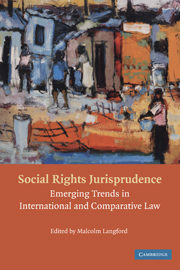Book contents
- Frontmatter
- Contents
- Foreword – Philip Alston
- Preface
- PART ONE OVERVIEW
- PART TWO SELECT NATIONAL JURISDICTIONS
- 4 South Africa
- 5 India
- 6 South Asia
- 7 Colombia
- 8 Argentina
- 9 Brazil
- 10 Venezuela
- 11 Canada
- 12 The United States
- 13 Hungary
- 14 France
- 15 United Kingdom
- 16 Ireland
- PART THREE REGIONAL PROCEDURES AND JURISPRUDENCE
- PART FOUR INTERNATIONAL HUMAN RIGHTS PROCEDURES AND JURISPRUDENCE
- PART FIVE SPECIAL TOPICS
- Notes on Contributors
- Table of Authorities
- Index
- References
14 - France
Rethinking ‘Droits-Créances’
Published online by Cambridge University Press: 05 June 2012
- Frontmatter
- Contents
- Foreword – Philip Alston
- Preface
- PART ONE OVERVIEW
- PART TWO SELECT NATIONAL JURISDICTIONS
- 4 South Africa
- 5 India
- 6 South Asia
- 7 Colombia
- 8 Argentina
- 9 Brazil
- 10 Venezuela
- 11 Canada
- 12 The United States
- 13 Hungary
- 14 France
- 15 United Kingdom
- 16 Ireland
- PART THREE REGIONAL PROCEDURES AND JURISPRUDENCE
- PART FOUR INTERNATIONAL HUMAN RIGHTS PROCEDURES AND JURISPRUDENCE
- PART FIVE SPECIAL TOPICS
- Notes on Contributors
- Table of Authorities
- Index
- References
Summary
INTRODUCTION
In the field of human rights, or to use a more recent term, some would say a more ‘fashionable’ one, fundamental rights, it is common to distinguish between individual rights and collective rights as well as between ‘droits-libertés’ and ‘droits-créances’. Social rights can come within each of these categories. However, it is the latter notion that is by far the most widely debated in France. Indeed, any discussion on social rights as constitutional ‘droits-créances’, that is, rights to claim a benefit or access to a service from public authorities, often tends to polemic. Also labelled ‘droits à…’ [rights to] (as opposed to ‘droits de…’ [rights of]), numerous academics have denied their justiciability and regretted the fact that their programmatic nature undermines the concept of subjective rights. These social rights as positive constitutional rights (droits-créances) will be the focus of this Section. A brief overview of the historical context surrounding their constitutional recognition (Section 2) as well as an understanding of the legal changes brought by the progressive emergence of the Conseil constitutionnel [Constitutional Council] as an effective constitutional judge (Section 3) appear imperative in order to fully appreciate the legal impact of the on-going ‘constitutionalisation’ of this particular category of fundamental rights (Section 4).
THE CONSTITUTIONAL RECOGNITION OF SOCIAL RIGHTS
Any overview of the constitutional recognition of social rights by the Preamble to the Constitution of 27 October 1946 (‘1946 Preamble’) should be preceded by a succinct presentation of the main characteristics of the founding text of French political modernity, the Declaration of Human and Civic Rights of 26 August 1789 (‘1789 Declaration’).
- Type
- Chapter
- Information
- Social Rights JurisprudenceEmerging Trends in International and Comparative Law, pp. 267 - 275Publisher: Cambridge University PressPrint publication year: 2009
References
- 2
- Cited by

